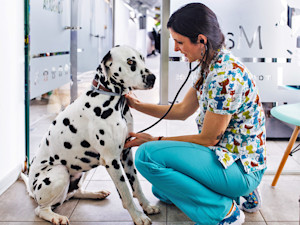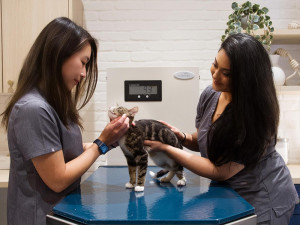4 Reasons You Should Break Up With Your Vet
And how to let them down easy.
Breaking up is hard. It’s especially hard when it comes to the people who take care of our pets. We all know veterinarians have one of the hardest jobs out there, so it can feel pretty crappy to leave a long-term provider.
But sometimes — whether it’s due to changes at your vet’s office, a new pet with different needs, or a plethora of other reasons — our vets stop being a good fit for us. I spoke with veterinary assistant Andrea Ward at the University of Missouri Veterinary Health Center about a few of the reasons you might want to change vets, and how you should tell them you’re not feeling the spark. (Plus, when it’s OK not to tell them.)
Reason 1: Your pet has complex health issues.
I personally switched vets several years ago when my dog was diagnosed with cancer. He had transitional cell carcinoma (TCC), which had been misdiagnosed as a UTI several times. Eventually, we wound up at an overnight emergency vet where we found a doctor who recommended more tests. This vet’s choice to run those tests got us a diagnosis, so we switched our primary care to him (even though that sometimes meant going to regular appointments at 9 p.m. and waiting for emergency patients to be seen first).
Switching to a vet who understood the complexity of my pup’s cancer and treatment ended up extending his life well past the expectancy for TCC. We were initially told he’d have four to six months, and we actually got a year and a half of high quality time together. Finding a vet who understood his specific issue made all the difference to us.
How much do you spend on your pet per year?
How to handle the switch: When changing care providers due to health issues, it’s always a good idea to tell your previous veterinarian. You’ll need to transfer all your pet’s records, and you may even want to update your old vet’s office about the situation. You can contact the old office by phone or email, or visit them in person if you have a good relationship.
Note: You may not need to switch vets entirely in these situations. Ward says: “If you feel like your pet’s medical issues are beyond what a general practitioner can treat, you can always ask your veterinarian for a referral to a specialist. These veterinarians spend extra years studying their speciality and are often on the forefront of new treatments and research.”
Reason 2: Your pet is afraid of the vet.
Pets have a long history of being afraid at the vet. That’s why Fear Freeopens in new tab was founded in 2016 to provide education and certifications to veterinary professionals on how to reduce fear during vet experiences. Pet care has historically been solely focused on the physical, but these days pet parents recognize that pets (just like people) are complex, emotional beings.
If your pet shows signs of distress at regular vet visits — like panting, whining, or shaking, or even refusing to go in the door — a Fear-Free office or veterinarian may be a good fit for you. “Fear-Free training is positive reward-based training. Part of our slogan is to “‘put the treat into treatment.’”
Chances are, they will want to know what they can do to improve your experience or rectify the situation,” Ward says. But if something specific has happened to cause fear in your pet at a particular office, and you don’t feel comfortable making the call, “you can ask the staff [of your new practice] to call your previous veterinarian” and have your pet’s records transferred that way.
How to break the news: A good veterinarian should understand your reasoning for choosing a Fear-Free clinic. If you’re on good terms with your provider, just let them know you’re transitioning to a lower-stress environment for your pet or pets.
Reason 3: You’re moving.
Breaking up with a vet due to moving is heartbreaking for everyone — especially if you loved your care provider. If you’re on good terms with the folks at your current clinic, ask them for recommendations in the area you’re moving to. They may be able to connect you with someone similar.
How to make a clean break: Get your pet’s records from your vet before you move if possible. In case there’s an emergency before you’ve established care at a new practice, you’ll want to have their medical information handy. Make sure to keep it with your other easy-access files so it doesn’t get buried in that stack of boxes we all have in the basement. You can also use a pet-health app, like the Kinopens in new tab, to store your pet’s records digitally and all in one place.
Reason #4: It’s just not the right fit.
Sometimes, you’re just not in love with your vet. “You don’t need to justify your reason for wanting to switch practices,” Ward adds. “Maybe you just don’t feel like the current vet you see is a good fit for you.”
This is true in many cases and can change from pet to pet. (My cat is terrified of the vet, while my dog will run full-speed through the office door for hugs and treats.) Whether you find that you disagree with your vet’s theories and practices, or simply don’t get along with them personally, it’s totally OK to make a decision based on this relationship. After all, you’ll be working with this person closely for the rest of your pets’ lives!
How to handle the breakup: If you’re comfortable with it, it’s great to let your vet know your reasoning for leaving their practice. But in this case, especially if you’ve had a disagreement or falling out with your care provider, it’s totally OK to ask your new vet’s office to call and get your pets’ records.
While it’s courteous to say goodbye, don’t forget you’re paying for these services, and if the standard of care or service you’ve received hasn’t been up to par (or even if confrontation is just really not your thing), you’re not required to go above and beyond when leaving the practice.
General tips for switching vets
Regardless of your reasoning, there are some tips that can make your breakup easier to handle.
Rip off the Band-Aid.
When you’re switching vets, just bite the bullet. It’s better to have one difficult conversation than to try to handle things slowly (not speaking from experience or anything). If you don’t switch cleanly, it can be hard to keep track of which records are where, which vet each pet has seen, etc.
Play the field.
Spend time finding the vet who’s truly right for you and your pets. You don’t want to go through the ordeal of breaking up with your vet, just to repeat the process again with a new practice. Take your time and test out a few different places or get reviews from trusted friends and family before deciding on a new practice.
Don’t fret too much over telling them.
I spoke with several folks in the veterinary industry while writing this piece, and most of them said they didn’t think most vets take it personally when you switch practices. While it may be a courtesy to let them know your reasoning, it’s not a requirement — especially if you’ve had a bad experience.
If you just don’t see a future together, it really is fine.
Ward says, reassuringly: “Veterinary professionals understand that not every practice or doctor is the right fit for each person, and moving your pet to a different veterinarian should be simple (and less stressful than you would expect).”
Ultimately, the vet or clinic you choose to care for your pet is a highly personal decision. Don’t take it lightly, but don’t take the breakup too hard, either. Your former vet will make someone very happy… just not you.













